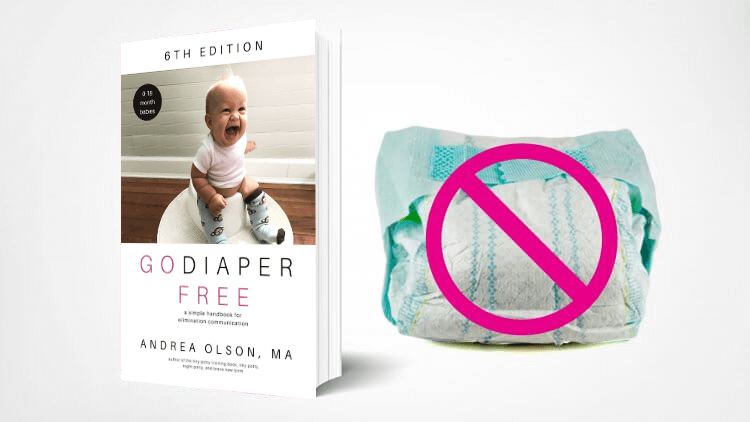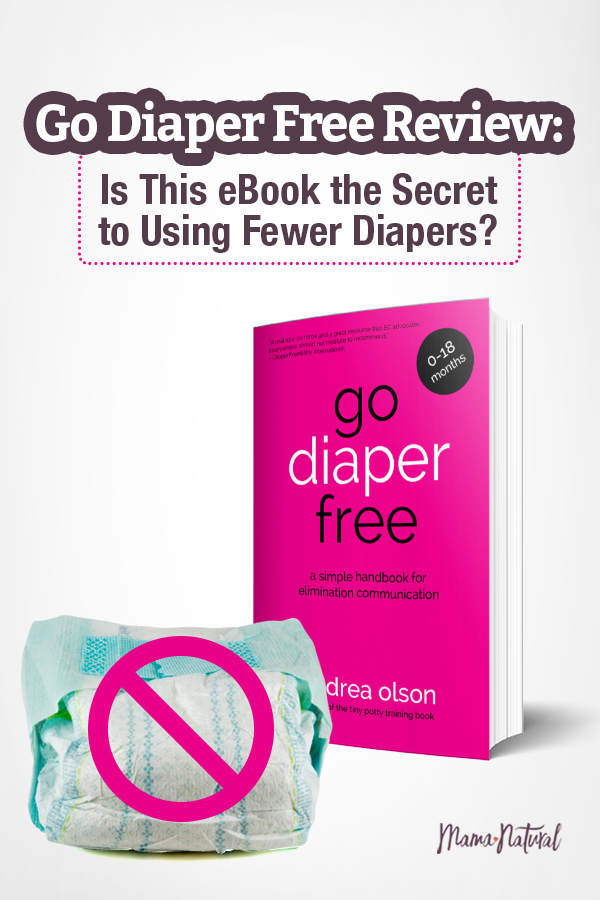
Can the “Go Diaper Free” ebook help you master EC or elimination communication? Find out in my comprehensive review. Plus, grab a promo code for the book!

In the U.S., the average toddler isn’t fully potty trained until age three, but internationally 50 percent of babies reach this milestone by 12 months old. (source) This is largely in part to a practice called elimination communication (EC). For many, those words conjure images of a naked baby running around, but Andrea Olson, a psychiatrist and author of the popular ebook Go Diaper Free says EC isn’t about being totally wild and free—it’s about gently encouraging your baby to use the potty from an early age.
Sound intriguing? This comprehensive review of her book, Go Diaper Free, will explain how this valuable resource can help you master elimination communication.
EC, infant potty training, or diaper-free are all terms for the same process. It’s a gentle, non-coercive alternative to diapers and traditional potty training to help your baby meet their elimination needs. In practical terms, caregivers respond to behavioral cues and help baby go potty in a small toilet (or something similar) instead of a diaper.
Why would anyone want to do this? There are tons of myths about EC—namely that it’s going to take forever and be really messy. While it is a commitment, it’s one that’s totally doable and there are tons of advantages to elimination communication:
Get free updates on baby’s first year! – Free Updates on First Year [In-article]
If elimination communication sounds like something you might want to try, Go Diaper Free is the ultimate resource.
In it, author and Psychiatrist Andrea Olson leverages over five years of research and hands-on experience to explain everything you could ever want to know about the process in detail. Here’s a summary of what’s included in this extensive elimination communication resource.
With our special promo code, you can get 20% off the Go Diaper Free ebook. The digital package includes:
First, click to copy code…MAMANATURALCopied to clipboard!
When does your baby need to use the bathroom? How soon after eating or waking do they poop/pee? Some babies give obvious signals, like squirming or a potty dance, while others are harder to read. Olson covers all of the most common baby signals in detail to help caregivers recognize baby’s potty language.
This stage, called observation, is done without a diaper so it’s easier to pick up on baby’s signals and natural timing. This isn’t a license for little ones to pee on the floor whenever and wherever, though, and the book covers ways to prevent that.
When its obvious baby needs to go (or is already going!), it’s time to move to the potty receptacle of choice. Olson explains that the best way to let baby know it’s ok to go potty is to use a sound cue or a word or sign language for older babies. Eventually your baby will use this sound, word, or sign themselves to tell you they need to potty.
As baby gets older, their signals may change, and this section helps you stay on top of that by including month-by-month examples.
Other than baby’s signals, there a several ways to gauge when they likely need to go. Olson covers these in detail, including:
After you’ve observed your baby’s needs, it’s finally time to implement the diaper free method. Olson breaks the process down and covers each of these steps in detail, but here are the basics:
The ideal time to start the EC method is between the newborn stage and four months old, but older babies can still benefit from EC. If you fall into this category, Olson provides tricks to make the process smoother.
She also includes suggestions for when to use cloth diapers vs. disposable diapers as a backup and at what ages. There’s also tips for what to tell your older baby to keep them on track when they pee outside their designated potty space.
If baby isn’t getting it and nothing is working, Olson explains how to get things on track. She calls this a “reset,” and this section of the book includes step-by-step tips to help troubleshoot and reset the EC experience.
Classic cradle, straight leg potty, breastfeeding sink position… Olson provides detailed examples of common (and not so common) EC positions so you can choose which potty positions will work best for your baby. This section also includes information about:
It’s important to know how to position baby in different situations, but there’s more to it. This section of Go Diaper Free covers the how behind pottying baby in unique situations, including how to:
Olson explains that caregivers can choose to skip the EC method at night and rely on diapers or continue the process, but notes that co-sleeping makes EC easier, as your baby adapts to your rhythms and it’s easier to pick up on their nighttime signals. Olson also covers how to EC at night if baby has their own sleep space.
In this section, you’ll see examples of the nighttime EC potty set ups Olson used for her children as they transitioned from newborn to potty independent stage.
Even working parents can successfully use the EC method with their little ones. Go Diaper Free has tips to help avoid confusion and interruption of your baby’s adopted EC routine. Some of these tips include co-sleeping and babywearing.
If you’re away at work, Go Diaper Free explains how a babysitter or daycare can still help with the EC method to prevent regression and confusion for your little one.
Olson explains that daycares won’t EC to the same extent, but there are reasonable ways caregivers can help keep EC a constant for your little one. The bonus readers area includes a template letter to a daycare that can be given to the supervising attendant and a real life example of a day in the life of a working EC parent.
Diapers are a great teaching tool and a backup safety measure, but not always necessary with EC. In this section of Go Diaper Free, Olson covers when your child may benefit from a diaper and times they may do better without one. She explains that the point is to have good communication, help set them up for independent potty use, and avoid peeing everywhere in the process.
At the end of the how-to part of Go Diaper Free, there’s even more EC info, including:
Ashley L. recently wrote to us with this feedback about Go Diaper Free:
We actually used this book to potty train at 18 months. It took two weeks, and my son who is now almost 20 months, potty trained himself through the night as well. ??♀️ Don’t ask me how. He just wakes up on his own and says “pee-pee.” Of course it helps that we still bed share at his age. I can see how not bed and room sharing could complicate night training.
My son has not had any accidents after the two week mark of training. We are super proud of him.
My husband was reluctant at first and I put my foot down to tell him that I’m the potty training boss and he had to follow me. ? Our next step is to teach our son to pull his pants up and down better.
Thanks for listening and sharing!
The EC method can be confusing to navigate, but Olson lays it all out in this comprehensive guide. Go Diaper Free helps give parents the confidence they need to successfully implement EC, while guiding their child to potty independence.
With our special promo code, you can get 20% off the Go Diaper Free ebook. The digital package includes:
First, click to copy code…MAMANATURALCopied to clipboard!
If you’re interested in learning more about potty training, you may be interested in Andrea Olson’s other ebook, The Tiny Potty Training Book. The book promises to help you potty train any child ages 18-30+ months in just seven days.
Are you on board with the EC method? Willing to try? Not so sure? Let us know in the comments!

Genevieve Howland is a doula and childbirth educator. She is the bestselling author of The Mama Natural Week-by-Week Guide to Pregnancy and Childbirth and creator of the Mama Natural Birth Course. A mother of three, graduate of the University of Colorado, and YouTuber with over 135,000,000 views, she helps mothers and moms-to-be lead healthier and more natural lives.
Elimination Communication saved us so many dirty diapers and butt wipes, and I’m sure it helped my son feel more calm and understood. As long as you can keep yourself from getting obsessive/competitive about catching all the pees and poops, EC makes parenting easier and cleaner!
We didn’t follow the Go Diaper Free advice on wrapping up very well, but when we did finally really work on increasing his independence and getting away from diapers, he took to it right away and was pretty much potty trained within a week at 19 months. We just use diapers at nighttime now and sometimes get one or two wet ones, but haven’t had any daytime misses for about a month even with traveling!
I wish I had done easy with my first. I did start sitting him on the potty around 10 months, but life got crazy and I stopped doing it. Really wish I had stuck with it way more consistently because potty training was a nightmare, although he is now potty trained And has been for about a month if you count only having a couple of accidents a week as potty trained, sometimes less. He will be three in September. I plan to EC from birth, at the very least part time, with my second.
I used the Tiny Potty Training Book for both my kids. My daughter started at 18 months and was potty trained in 2 days. My son started at 16.5 months, and took three weeks. Amazed at the results, and how the method is simple, kind, and power struggle free. Plan to use it with all my kids! So happy to be done with diapers!
In many parts of the world EC is assumed to be the most obvious and widely practiced method. There are SO many advantages! It worked for us with both our sons.